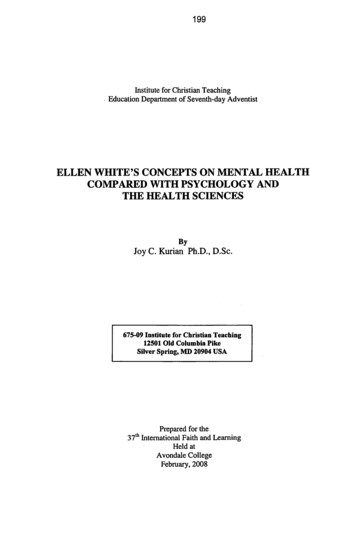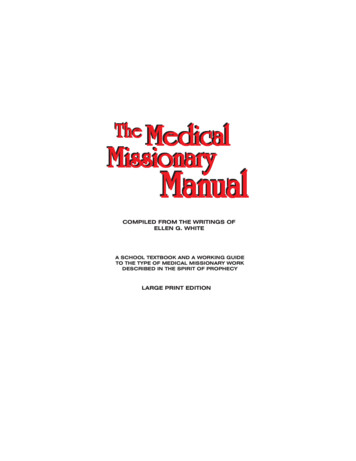
Transcription
199Institute for Cluistian Teaching. Education Department of Seventh-day AdventistELLEN WHITE'S CONCEPTS ON MENTAL HEALTHCOMPARED WITH PSYCHOLOGY ANDTHE HEALTH SCIENCESByJoy C. Kurian Ph.D., D.Sc.675-09 Institute for Christian Teaching12501 Old Columbia PikeSilver Spring, :MD 20904 USAPrepared for the37th International Faith and LearningHeld atAvondale CollegeFebruary, 2008
2002IntroductionBrief Biographical Sketch of Ellen WhiteEllen Gould Harmon was born at Gorham, Maine, in the northeastern part of America onNov. 26, 1827. Her parents, Robert and Eunice Harmon, were devout members of theMethodist Episcopal Church who had the joy of witnessing their eight children acceptingthe Lord Jesus Christ as their personal Savior.When Ellen was nine, on her way home from school, she was seriously injured when shewas struck on the nose by a rock thrown by a schoolmate. Severely traumatized by thisincident, she remained unconscious for three weeks and grew very weak and frail. Withtime she did recover but the injury prevented her from being able to continue hereducation.Ellen Harmon was moved by the Holy Spirit to study the scriptures diligently, to live asimple life and to wait upon the Lord for His directions. On August 30, 1846, EllenHarmon was united in marriage to Elder James White who had enjoyed a deep experiencein the advent movement. Regarding her marriage, she says, "Our hearts were united inthe great work, and together. we traveled and labored for the salvation of souls" (White,1855-1909, vol. 1. p.75).In the autumn of 1846 Ellen and James White began to observe the Bible Sabbath, and totea hand defend it. Together they traveled, preached and wrote with great zeal andenergy for thirty-six years. However, owing to three strokes followed by paralysis, JamesWhite's health failed him and he passed away leaving Mrs. White to complete hermission and to 'fight the battle' alone.Arthur L. White, one of the seven grandchildren of James and Ellen White, summarizesthe achievements of this great founder of the Adventist Church in the following manner:"In brief, she was a woman of remarkable spiritual gifts who lived most of her life duringthe nineteenth century (1827-1915), yet through her writings she is still making arevolutionary impact on millions of people around the world. During her lifetime shewrote more than 5,000 periodical articles and 40 books; but today, including compilations
2013from her 50,000 pages of manuscript, more than 100 titles are available in English. She isthe most translated woman writer in the entire history of literature, and the mosttranslated American author of either gender. Her writings cover a broad range of subjects,including religion, education, social relationships, evangelism, prophecy, publishing,nutrition, and management. Her life-changing masterpiece on successful Christian living,Steps to Christ, has been published in more than 140 languages. Seventh-day Adventistsbelieve that Mrs. White was more than a gifted writer; they believe she was appointed byGod as a special messenger to draw the world's attention to the Holy Scriptures and helpprepare people for Christ's Second Advent. From the time she was 17 years old until shedied 70 years later, God gave her approximately 2,000 visions and dreams. The visionsvaried in length from less than a minute to nearly four hours. The knowledge and counselreceived through these revelations she wrote out to be shared with others. Thus herspecial writings are accepted by Seventh-day Adventists as inspired, and their exceptionalquality is recognized even by casual readers. The writings of Ellen White are not asubstitute for Scripture. They cannot be placed on the same level. The Holy Scripturesstand alone, the unique standard by which her and all other writings must be judged andto which they must be subject" (White, 1855-1868, vol. 1. p. 1).Statement of PurposeThe unique and outstanding feature of Ellen White's writings is that they are over 100years ahead of her time. Her writings contained information not known by the scientistsand psychologists of that era and as such, many people have asked, How couldinformation written so many years ago have value today? The fact is that many of theseprinciples have stood the test of time and have been verified by science in remarkableways. This paper makes a humble attempt of comparing some of the writings of EllenWhite on mental health with psychology and the health sciences.Concepts of the Mind, Health, Mental Health and Mental DisorderThe mind is a very complex bioelectric supercomputer. The mind has both hardware andsoftware. The hardware refers to the actual physical components from which a computeris built. The hardware that forms our mental computer is the brain tissue with its billionsof neurons. However, the computer cannot function with only the hardware. It musthave functional software which is the operating system like Microsoft Windows. This
2024system gets installed during childhood and constantly undergoes modificationsthroughout life. In general our culture which includes, the language we speak, the Godwe worship, our beliefs, values, morals, how we play and interact with others are part ofthis complex operating system. The hardware and software mentioned above are still notenough for a computer to work. It must also have a faultless energy source. The energysource for our brain is the oxygenated blood that brings nutrients and takes away waste.If something interferes with a reliable and consistent blood flow or if the blood itself isunhealthy, then the function of the brain suffers. Thus, a healthy lifestyle is pertinent fora healthy mind (Jennings, 2007, pp. 9, 10).The World Health Organization states that "Health is a state of complete physical,mental, and social well-being and not merely the absence of disease or infirmity" (WHO,1947, vol. 1, p. 29).From this definition it is very clear that health is a holisticphenomenon which integrates our body, our mind and our social interactions with ourfellow men. Some people blame their genes, they say they have inherited bad genes fromtheir parents and that is why they are suffering. Here is what Neil Nedley, in his CDROM entitled Proof Positive has to say to such people, ''The good news is that eventhough we cannot change our genetics, we can change our lifestyle. Those lifestylechoices can prevent or forestall the development of diseases for which we are geneticallypredisposed." Regarding the most common diseases, Dr. Lamont Murdoch of LornaLinda University School of Medicine has put it aptly: "faulty genetics loads the gun,lifestyle pulls the trigger."Way back in 1888, Friedrich Nietzsche said, (2000, Thompson) "Health and sickness arenot essentially different, as the ancient physicians and some practitioners even todaysuppose. One must not make of them distinct principles or entities. In fact, there areonly differences in degree between these two kinds of existence."Despite the fact that there is no universal or comprehensive definition of mental health,people in the health sciences and other helping professions seem to agree that mentalhealth is a positive state in which one is accountable or responsible, displays selfawareness, is self-directive, is reasonably worry free, and can cope with the usual daily
2035tensions. Such individuals function well in society, are accepted within a group, and aregenerally satisfied with their lives (Shives, 2005).Menninger (1946, p. 2) says, "Let us define mental health as the adjustment of humanbeings to the world and to each other with a maximum of effectiveness and happiness.Not just efficiency, or just contentment, or the grace of obeying the rules of the gamecheerfully. It is all these together. It is the ability to maintain an even temper, an alertintelligence, socially considerate behavior, and a happy disposition. This, I think, is ahealthy mind."This defmition is important in that it brings into consideration therelationship of the individual and society.In an extended description of individualmental health, Soddy, (1950, p. 72) suggested, among other points, that the healthy mindcan meet with ease all normal environmental situations and that the healthy mindedperson has the capacity to live harmoniously in a changing environment.''The American Psychiatric Association (APA, 1994) defines mental illness or mentaldisorder as an illness or syndrome with psychologic or behavioral manifestations and/orimpairment in functioning due to a social, psychologic, genetic, physicaVchemical, orbiologic disturbance. The disorder is not limited to relations between the person andsociety. The illness I characterized by symptoms and/or impairment in functioning."It has been aptly said by Hinkle (1973, p. 43) that, "to be alive is to be under stress."Mental disorder, as we understand it today, is essentially the result of the influence ofmultiple dynamic forces. It includes a wide range of abnormal states of mood, thought,and behavior, ranging from mild anxiety and tension to severe disorganizing psychosis(Kurian, 1981, p. 1). Mental health and mental disorder are like the two sides of a coin.Mental health is the goal to be attained and mental disorder is the problem that needs tobe eradicated from the world we live in.Perspectives on Psychological DisordersA general view of the perspectives on psychological disorders will make the presentessay clearer.There are several psychology books that discus these views at greatlengths, however, only a summary taken from Feldman (2008, p. 452) has been presentedbelow:
20461) Medical perspective: assumes that physiological causes are at the root ofpsychological disorders.2) Psychoanalytic perspective: argues that psychological disorders stem fromchildhood conflicts.3) Behavioral perspective: assumes that abnormal behaviors are learned responses.4) Cognitive perspective: assumes that cognitions (people's thoughts and beliefs)are central to psychological disorders.5) Humanistic perspective: emphasizes people's responsibility for their ownbehavior and the need to self-actualize.6) Socio-cultural perspective: assumes that behavior is shaped by family, society,and culture.The picture within the walls of mental hospitals is saddening. Great numbers of thementally ill still live shut away behind walls by the prejudices and incomprehension's ofsociety. The efforts of the most advanced psychiatrists to have the mentally ill treated asother sick people, who can be cured, are likely to remain fruitless as long as the irrationalfear of "madness" is not conquered.Today the battle for mental health is being fought on many fronts. The psychiatrist hasceased to be merely a "doctor for the insane." With the help of his colleagues from otherdisciplines like genetics, biology, medicine, psychology, anthropology and sociology, henow tries to disentangle the multidimensional mental syndromes to bring about relief tothe suffering millions.Body and Mind RelationshipsMental Health and Mental Disorder Propounded by Ellen WhiteIn some of the statements presented below by Ellen White, I strongly believe that Godtruly gave her insightful and discerning words of wisdom which she wrote down for thebenefit of mankind. She expounds on several areas of the mind and body relationships.She admonishes all by saying that nine tenths of diseases originate in the mind; that inorder to have a healthy brain one needs proper nourishment; that disease is greatlyaggravated by ones imagination; that a cheerful, unselfish heart works against theotherwise ruinous effect of anger, discontent, and selfishness; that some people are sick
2057and will remain sick as they lack the willpower to combat disease; and that thedevelopment of a sound mind in a sound body is of the greatest importance.Ellen White talks of a mysterious interrelationship that exists between the body and mind.She says (White, 1855-1909, vol. 3, pp. 485, 486), "Between the mind and the body thereis a mysterious and wonderful relation. They react upon each other. To keep the body ina healthy condition to develop its strength, that every part of the living machinery mayact harmoniously, should be the first study of our life. To neglect the body is to neglectthe mind. It cannot be to the glory of God for His children to have sickly bodies ordwarfed minds."Today it is a known fact that the body and mind are closely related. When one is affectedin any way, the other sympathizes. Psychologists tell us to avoid reading letters whenyou are having a meal with the view that if there is distressing news in the letter, it wouldaffect the digestive processes. Way back in 1872 Ellen White said something similar(1872, v. 3, p. 184), "A great deal of the sickness which afflicts humanity has its origin inthe mind and can only be cured by restoring the mind to health. There are very manymore than we imagine who are sick mentally. Heart sickness makes many dyspeptics, formental trouble has a paralyzing influence upon the digestive organs."Modem psychiatric problems were referred to as sickness of the mind or abnormalbehavior in the past and this is prevalent everywhere. Literally, the word abnormalmeans, "away from the norm".behavior.All societies have certain standards of acceptableBehavior that deviates from society's notion of normal behavior is oftenconsidered to be abnormal.In traditional psychiatric text, the terms 'neurosis' and'psychosis' are commonly used. People suffering from neurotic disorders, by and large,were believed to retain insight into their everyday thoughts and functioning. They could,however, experience intermittent or constant anxiety or depression. Psychosis on theother hand, was a term used to describe disorders such as schizophrenia and manicdepression, where the symptoms experienced by the sufferer were not like those that anormal person would experience (Thompson, 2000).
2068"Nine tenths of the diseases from which men suffer from have their foundation in thisarea. It may have started as a small problem at home that appears like a little sore, eatingup the energy and weakening the body. Guilt caused by sin sometimes undermines thephysical condition which leads to instability of the mind" (White, 1885, p. 59).The state of the mind affects the health of the physical system. If the mind is free andhappy, from a consciousness of right doing and a sense of satisfaction in causinghappiness to others, it creates a happiness that will react upon the whole system, causinga freer circulation of the blood and a toning up of the entire body. The blessing of God isa healing power, and those who are abundant in benefiting others will realize thatwondrous blessing in both heart and life (White, 1890, p. 13).The brain is the central and chief organ of the mind, and it controls the whole body. If theother parts of the human system are to be healthy, the brain must be healthy too. If thebrain is to be healthy, then the blood also must be pure. By practicing correct and healthyhabits of eating and drinking the blood can be kept pure and in tum the brain will also bewell nourished (White, 1932, p. 291).''The influence of the mind on the body, as well as of the body on the mind should beemphasized. The electric power of the brain, promoted by mental activity, vitalizes thewhole system, and is thus an invaluable aid in resisting disease. This should be madeplain. The power of the will and the importance of self-control, both in the preservationand in the recovery of health, the depressing and even ruinous effect of anger, discontent,selfishness, or impurity, and on the other hand the marvelous life-giving power to befound in cheerfulness, unselfishness, gratitude, should be shown" (White, 1903, p. 197).Ellen White says, (1932, p. 106) "In journeying I have met many who were reallysufferers through their imaginations. They lacked willpower to rise above and combatdisease of body and mind; and, therefore, they were held in suffering bondage. Goodhealth, sound minds, and pure hearts are not made of the frrst importance in households.Many parents do not educate their children for usefulness and duty. They are indulgedand petted, until self-denial to them becomes almost an impossibility. They are not taught
2079that to make a success of Christian life, the development of sound minds in sound bodiesis of the greatest importance".While giving admonitions to ministers, schoolteachers and students Ellen Whiteemphasizes the need to exercise all parts of the body and not just the mental faculties.Here is what she says (1855-1909, vol. 3, p. 490), "When the minds of ministers,schoolteachers, and students are continually excited by study, and the body is allowed tobe inactive, the nerves of emotion are taxed, while the nerves of motion are inactive. Thewear being all upon the mental organs, they become overworked and enfeebled, while themuscles lose their vigor for want of employment. There is no inclination to exercise themuscles by engaging in physical labor, because exertion seems to be irksome." How truethis is when we look at our administrators and teachers who live a sedentary life-style byspending most of their time in their offices and in committees. They hardly spend timeout of doors to exercise and give support to the circulatory, respiratory and all the othervital systems of the body.Ellen White ( 1905, p. 241) says, ''The condition of the mind affects the health to a fargreater degree than many realize . Grief, anxiety, discontent, remorse, guilt, distrust, all.tend to break down the life forces and to invite decay and death.Disease is sometimesproduced, and is often greatly aggravated, by the imagination. Many are lifelong invalidswho might be well if they only thought so . Many die from disease, the cause of which iswholly imaginary . In the treatment of the sick, the effect of mental influence should notbe overlooked. Rightly used, this influence affords one of the most effective agencies forcombating disease."Mental Health and Mental Disorder Propounded by Psychologists andPsychotherapistsPsychology as a discipline has become a popular field of study in many colleges anduniversities today. A large number of students graduate with psychology majors. Someof them specialize in Counseling or Clinical Psychology and enter the teachingprofession. Others become counselors and offer their services in educational institutions,industries, and institutions for the handicapped. Those with a strong background in
20810Clinical Psychology could work in general hospitals or in institutions that take care ofpsychiatric or behavioral problems.Psychologists and Psychotherapists support the view that "Mental health is a conditionwhich permits the optimal development, physical, intellectual and emotional, of theindividual, so far as this is compatible with that of other individuals. A good society isone that allows this development to its members while at the same time ensuring its owndevelopment and being tolerant towards other societies" (Soddy, 1950, p, 72).There are many psychologists and psychiatrists who support the position of SigmundFreud, who describe belief in God as a "societal neurosis" and called for intellectualunderstanding to remove the need for such a belief. Others, who identify themselves asneuropsychiatrists, consider mental illness as a result of chemical imbalance in the brainand try to find medicines that would correct the imbalance (Jennings, 2007, p. 11).Floyd L. Ruch (1948, pp. 176-177) says, "Strong psychological components often arefound in such respiratory illnesses as asthma; heart and circulatory disorders as highblood pressure and neuron-circulatory asthenia which is weakness of the nervous andcirculatory systems and skin ailments as urticaria. Medical men estimate that about halfof all patients going to physicians have illnesses precipitated largely by prolongedemotional disturbance".Aspects of Mental Health and Emotional Illnesses byEllen White compared with Psychologists and PhysiciansAnger is an emotional state that varies in intensity from mild irritation to intense fury andrage. Psychologists tell us that like other emotions, it is accompanied by physiologicaland biological changes; when you get angry, your heart rate and blood pressure go up, asdo the levels of your energy hormones.Anger can be caused by both external and internal events. You could be angry at aspecific person, like a fellow worker or supervisor or it could be an event, like a traffic
20911jam or a canceled flight. It could also be caused by worrying or brooding about yourpersonal problems. Memories of traumatic or enraging events can also trigger angryfeelings.Psychologists also tell us that some people are more "hotheaded" than ot?ers are; they getangry more easily and more intensely than the average person does. There are also thosewho don't show their anger in loud spectacular ways but are chronically irritable andgrumpy. Easily angered people don't always curse and throw things; sometimes theywithdraw socially, sulk, or get physically ill.Here is what Ellen White (1889, pp. 92, 93) had to say about anger. "If we indulge anger,lust, covetousness, hatred, selfishness, or any other sin, we become servants of sin."Noman can serve two masters" (Matthew 6:24). If we serve sin, we cannot serve Christ. TheChristian will feel the promptings of sin, for the flesh lusteth against the Spirit; but theSpirit striveth against the flesh, keeping up a constant warfare. Here is where Christ'shelp is needed. Human weakness becomes united to divine strength, and faith exclaims,Thanks be to God, which giveth us the victory through our Lord Jesus Christ1 Corinthians 15:57 ."There are many people in prison who are serving a life-term as their anger led to themurder of their close kin, friends or neighbors. Here is what Ellen White ( 1977, vol. 2, p.519) advised regarding violent anger. "The giving way to violent emotions endangerslife. Many die under a burst of rage and passion. Many educate themselves to havespasms. These they can prevent if they will, but it requires willpower to overcome awrong course of action. All this must be a part of the education received in the school, forwe are God's property. The sacred temple of the body must be kept pure anduncontaminated, that God's Holy Spirit may dwell therein."GuiltPsychologists and Physicians tell us that Guilt is the inability to forgive oneself for aperceived wrongdoing. Perceived wrongdoing means that you believe you have donesomething wrong. The wrongdoing may or may not have had negative consequences foryourself and/or others. If others were involved, they may or may not still be angry or hurt
21012by the wrongdoing. A perceived wrongdoing may be an action, a thought or a feeling. Ifthe wrongdoing was an action, you probably think of it as a mistake. You feel guilty forthe wrongdoing because you cannot forgive yourself for it. You cannot let it go. If youcannot forgive yourself, you will not overcome the guilt.It is sin that causes guilt and Ellen White ( 1956, p. 19) tells us that through a closecommunion with God one can ask for forgiveness of the sins and God will free us fromthe burden of guilt.GriefIn a BBC presentation, (Jan. 21, 2008) Dr. Trisha Macnair said, Bereavement is animmensely stressful event that can take a huge toll on the body, causing all sorts ofphysical problems, including exhaustion, uncontrollable crying, sleep disruption,palpitations, shortness of breath, headaches, recurrent infections, high blood pressure,loss of appetite, stomach upsets, hair loss, disruption of the menstrual cycle, irritability,worsening of any chronic condition such as eczema or asthma, and visual and auditoryhallucinations.This statement is well supported by Ellen White (1977, vol. 2, p. 461) when she wrote toa certain brother. She said, "Your wife was the subject of disease and death. Your griefwas just as intense as all your other troubles. You hugged the grief to your bosom, youloved to dwell upon it, and you allowed your mind and thoughts to be selfishly occupiedwith your grief, and as a consequence your health suffered. Then your daughter's deathwas indeed a sad blow, but others have passed through the same under more tryingcircumstances. You allowed this affliction to unman you; you dwelt upon it, you talked ofit, you aggravated your soul over a matter you could not change or help. It was a sin totake any of these afflictions as you have done. I know whereof I speak. If the mind ispermitted to be clouded with grief, the food is not digested and as a result the system isnot well nourished."Ellen White (1977, vol. 2, p. 458) also talks about how thecirculatory system is affected with grief and sadness. She said, "Sadness deadens thecirculation in the blood vessels and nerves and also retards the action of the liver. Ithinders the process of digestion and of nutrition, and has a tendency to dry up the marrow[interior substance] of the whole system".
21113Worry and AnxietyIn a study conducted by the National Institute of Mental Health in the US, it was reportedthat 16% (over 19 million) Americans suffer from anxiety disorders (Nedley, 2005, p.125). There are several people in the world today who get worried and anxious aboutperforming even normal duties at home, school or at work. Ellen White tells us thatanxiety tends to cause sickness and disease. I have personally come across individualswho were not able to organize their duties when they were given multiple tasks thatneeded to be performed within a specified time. Very often they would get angry, tenseand even develop headaches. Ellen White says, (1905, p. 229) "When wrongs have beenrighted, we may present the needs of the sick to the Lord in calm faith, as His Spirit mayindicate. He knows each individual by name and cares for each as if there were notanother upon the earth for whom He gave His beloved Son. Because God's love is sogreat and so unfailing, the sick should be encouraged to trust in Him and be cheerful. Tobe anxious about themselves tends to cause weakness and disease. If they will rise abovedepression and gloom, their prospect of recovery will be better; for "the eye of the Lord isupon them" "that hope in His mercy" (Psalm 33:18)."Psychologists and Psychotherapists tell us that many diseases result from mentaldepression and this is well supported by Ellen White (1868, vol. 1, p. 702) who says, "Acontented mind, a cheerful spirit, is health to the body and strength to the soul. Nothing isso fruitful a cause of disease as depression, gloominess, and sadness." She also says that"Many of the diseases from which men suffer are the result of mental depression"(White, 1905, p. 241).A careful study of the above emotions brings to light the fact that they could easilyappear in anybody but a lot depends on the individual's personality and upbringing forthe way he or she handles these emotions. With God's help, all things are possible.Daniel Goleman (2006, p. 83) who is a specialist in Social Intelligence says, "Allemotions are social, . you can't separate the cause of an emotion from the world ofrelationships-our social interactions are what drive our emotions."Warren Shipton(2007, p. 79) says, "Developing social and emotional skills is part of the rich frameworkthat we acquire through learning. The basic elements of such learning are the ability to
21214understand and reflect on our own emotions and appreciate and respond to the feelings ofothers. These competencies enable us to work through social and emotional issues."Adventist Teachers of Psychology and Mental HealthNeed for a Firm Foundation in the Bible to Withstand the Growing DangersAdventist teachers of Psychology and related fields do realize the fact that with theadvance in technology and especially the internet, we are in an age of informationexplosion and we need to be careful in the selection of the materials that we use in theclassroom. It is very easy for us to divert the tender minds of the students to that whichmay appear to be very new and interesting but if it is not carefully and prayerfullypresented, it may cause more harm to the students than good and this calls for a solid andfrrm foundation in the Holy Scriptures.To support the above view, consider the discussions in some psychology books on thevalues of hypnotism and psychic healing. Ellen White clearly warns physicians andteachers about it and tells us that we should not subject our minds to hypnotists as ourminds will become weak and in turn we could be easily controlled by Satan. About thisgrowing false science Ellen White ( 1977, vol. 2, pp. 713, 714 ) gave a warning to a.Physician who favored hypnosis, she said, "I am so weighed down in youF ·case that Imust continue to write to you, lest in your blindness you will not see where you need toreform. I am instructed that you are entertaining ideas with which God has forbidden youto deal. I will name these as a species of mind cure. You suppose that you can use thismind cure in your professional work as a physician. In tones of earnest warning the wordswere spoken: Beware, beware where your feet are placed and your mind is carried. Godhas not appointed you this work. The theory of mind controlling mind is originated bySatan to introduce himself as the chief worker, to put human philosophy where divinephilosophy should be. No man or woman should exercise his or her will to control thesenses or reason of another so that the mind of the person is rendered passively subject tothe will of the one who is exercising the control. This science may appear to besomething beautiful, but it is a science which you are in no case to handle. There issomething better for you to engage in than the control of human nature over humannature. I lift the danger signal. The only safe and true mind cure covers much. The
21315physician must educate the people to l
and will remain sick as they lack the willpower to combat disease; and that the development of a sound mind in a sound body is of the greatest importance. Ellen White talks of a mysterious interrelationship that exists between the body and mind. She says (White, 1855-1909, vol. 3, pp. 485, 486), "Between the mind and the body there










